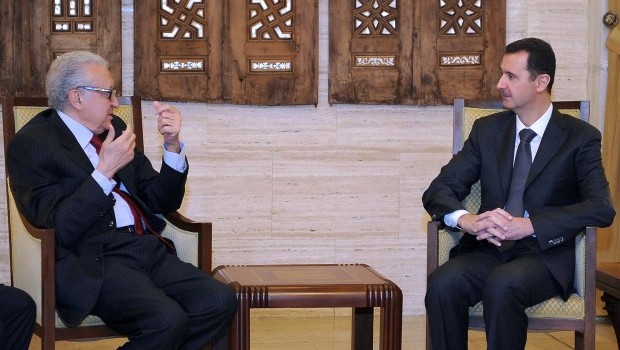
A handout picture released by the Syrian Arab News Agency (SANA) on December 24, 2012 shows Syrian President Bashar al-Assad (R) meeting with Peace envoy Lakhdar Brahimi in the capital Damascus. AFP PHOTO/HO/SANA
Is Syrian President Bashar al-Assad seeking a negotiated way to end his country’s bloody civil war?
This is the hope, some might say illusion, that the United Nations’ emissary Lakhdar Brahimi is trying to keep alive through diplomatic maneuvers.
Three factors have helped create this hope.
The first is John Kerry’s appointment as President Barack Obama’s Secretary of State. Unlike his predecessor Hillary Clinton, Kerry has a close understanding of the Syrian leader’s mindset. As a Democrat Senator, Kerry traveled to Damascus for meetings lasting several hours with Assad. Over the years, Kerry’s Portuguese-born wife Maria Teresa Thierstein brought the two families closer by forging a friendship with Assad’s wife Asma Akhras. Also interesting is the fact that Kerry’s daughter Vanessa is married to an Iranian doctor, expanding the Kerry family’s understanding of the region.
As a presidential candidate in 2004, Kerry attacked President George W Bush as a “trigger happy” leader addicted to “cowboy diplomacy”, and called for an overhaul of foreign policy. Last week, Kerry dropped tantalizing hints about “fresh ideas” to end the conflict in Syria.
The second factor that may give credence to hopes of a deal is the growing realization in Assad’s circles that the only way to enable the Baathists to retain a share of power is to persuade the president to move to the sidelines.
The third factor is the evolution of the Russian position. Moscow realizes that betting on Assad has led to Russia’s isolation in the Middle East. Thus, if Assad could be ditched without this appearing as a defeat for Russia, Moscow might be ready to cooperate.
According to our sources, the outline of a deal has been put to Assad with the help of two Lebanese politicians close to him. Under the proposed deal, Assad would agree to a transition during which he would “stand aside”. The choice of words is important because Assad insists he would not “stand down” before the end of his presidential term in May 2014.
A draft of the proposed deal states that Assad would nominate one of his vice presidents as head of a “government of transition”, in which opposition parties would nominate one third of the ministers. Another third would be chosen by the ruling coalition led by the Arab Socialist Baath Party, while the remaining third would consist of “respected personalities”, accepted by both sides.
The transitional government would propose constitutional amendments to be submitted to a referendum. It would then organize parliamentary and presidential elections within a year. Assad hopes to remain president until the end of his current mandate next year, and during that period he would delegate his executive powers to the prime minister, retaining his symbolic functions as head of state.
In exchange for “stepping aside” Assad wants immunity from prosecution on charges of war crimes and crimes against humanity. Any prosecution through the International Criminal Court would have to be ratified by the Security Council. A US veto could stop any such attempt, and thus Assad hopes that Kerry can obtain him the desired immunity.
Assad also wants “guarantees” that once a transition government is formed, the “Friends of Syria” group of over 100 nations will stop supporting armed opposition groups. In return the bloc, led by the US, would help establish a ceasefire enabling the Syrian army to “secure the nation’s borders” and restore law and order.
What Assad refuses to contemplate is a pledge not to run as a candidate in future presidential elections. Although most members of his family have left Syria for safety in exile, Assad himself rejects suggestions that he, too, should leave Syria.
The proposed deal has received a cautious welcome from parts of the Syrian opposition. However, the overwhelming majority, especially among armed opposition groups, does not trust Assad and sees the proposed deal as a trick to buy him time.
Most members of the “Friends of Syria” bloc also doubt Assad’s reliability. Several Arab states, notably Egypt, insist that Assad’s unambiguous departure from power should be the first step, not the last, in any transition.
Another problem is that Assad may no longer have the last word in Damascus, where Iran has created a network of its own within the ruling elite. Iranian “Supreme Guide” Ali Khamenei has repeatedly stated that he would not allow Assad to fall.
Analysts say, although a glimmer of hope remains, that Kerry and Brahimi may soon find that the light at the end of the tunnel was more of an illusion.

Thanks for any other wonderful post. The place else could anyone get that type of information in such a perfect method of writing? I have a presentation next week, and I’m at the search for such info.